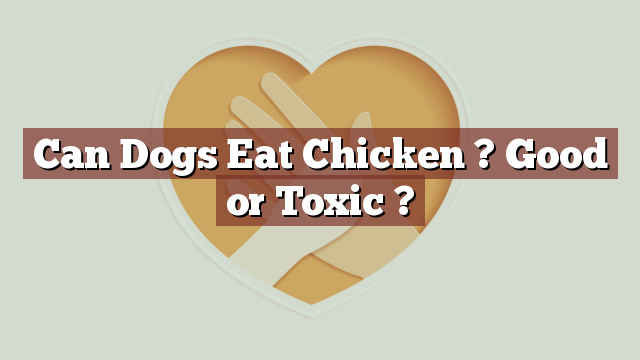Can Dogs Eat Chicken? Good or Toxic?
It is essential for pet owners to be knowledgeable about the types of food that are safe for their furry friends. Dogs, being omnivorous animals, can consume a variety of foods, including meat. But can dogs eat chicken? Let’s delve into the nutritional value, potential risks, and benefits associated with feeding dogs chicken to answer this question.
Nutritional Value of Chicken for Dogs: Protein, Vitamins, and Minerals
Chicken is a rich source of protein, which is a vital nutrient for dogs. Protein supports healthy muscle growth and repair, provides energy, and aids in the proper functioning of the immune system. Additionally, chicken contains essential vitamins such as B6 and B12, which contribute to overall well-being. It also contains minerals like iron, zinc, and selenium, which are important for maintaining healthy bones, teeth, and coat.
Chicken as Dog Food: Is it Safe or Toxic?
Yes, dogs can eat chicken. In fact, many commercial dog foods contain chicken as a primary ingredient. When cooked properly and served in moderation, chicken is safe for dogs to consume. However, it is crucial to ensure that the chicken is boneless, skinless, and free from any seasoning or additives. Bones, especially cooked ones, can splinter and cause harm to a dog’s digestive system. Additionally, certain seasonings and additives, such as garlic or onion, can be toxic to dogs.
Potential Risks and Benefits of Dogs Consuming Chicken
While chicken is generally safe for dogs, there are potential risks associated with its consumption. One risk is the presence of bacteria such as Salmonella or Campylobacter, which can cause foodborne illnesses in both dogs and humans. Therefore, it is crucial to handle and cook chicken properly to eliminate any harmful bacteria.
On the other hand, the benefits of dogs consuming chicken include improved muscle development, increased energy levels, and enhanced immune function. The protein content in chicken aids in maintaining a healthy weight and promotes lean muscle mass. Additionally, the vitamins and minerals present in chicken contribute to overall health and well-being.
What to Do If Your Dog Eats Chicken: Monitoring and Consultation
If your dog consumes chicken, it is essential to monitor their behavior and digestive system. Watch out for any signs of discomfort, such as vomiting, diarrhea, or lethargy. If your dog experiences any adverse symptoms or if you have concerns, it is advisable to consult a veterinarian. They can provide guidance based on your dog’s specific health condition and recommend the necessary steps to ensure your pet’s well-being.
Conclusion: Moderation and Proper Preparation Ensure Safe Chicken Consumption for Dogs
In conclusion, dogs can eat chicken, as it offers valuable nutritional benefits such as protein, vitamins, and minerals. However, it is crucial to feed them boneless, skinless chicken without any seasonings or additives. Proper cooking and handling of chicken are essential to eliminate the risk of bacterial contamination. As with any new food, it is important to introduce chicken to your dog’s diet gradually and monitor their reaction. By exercising moderation and following proper preparation guidelines, chicken can be a safe and healthy addition to your dog’s diet.
Thank you for investing your time in exploring [page_title] on Can-Eat.org. Our goal is to provide readers like you with thorough and reliable information about various dietary topics. Each article, including [page_title], stems from diligent research and a passion for understanding the nuances of our food choices. We believe that knowledge is a vital step towards making informed and healthy decisions. However, while "[page_title]" sheds light on its specific topic, it's crucial to remember that everyone's body reacts differently to foods and dietary changes. What might be beneficial for one person could have different effects on another. Before you consider integrating suggestions or insights from "[page_title]" into your diet, it's always wise to consult with a nutritionist or healthcare professional. Their specialized knowledge ensures that you're making choices best suited to your individual health needs. As you navigate [page_title], be mindful of potential allergies, intolerances, or unique dietary requirements you may have. No singular article can capture the vast diversity of human health, and individualized guidance is invaluable. The content provided in [page_title] serves as a general guide. It is not, by any means, a substitute for personalized medical or nutritional advice. Your health should always be the top priority, and professional guidance is the best path forward. In your journey towards a balanced and nutritious lifestyle, we hope that [page_title] serves as a helpful stepping stone. Remember, informed decisions lead to healthier outcomes. Thank you for trusting Can-Eat.org. Continue exploring, learning, and prioritizing your health. Cheers to a well-informed and healthier future!

